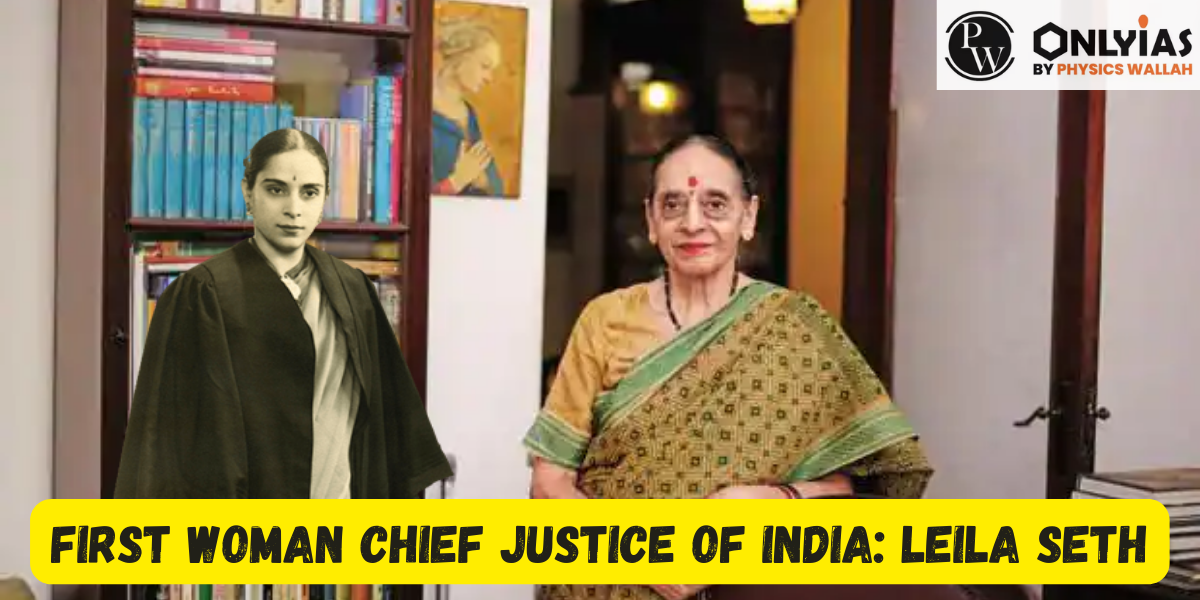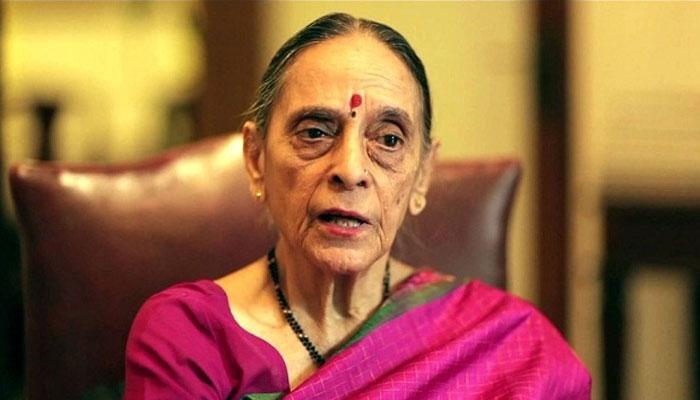
First Woman Chief Justice of India: Leila Seth (October 20, 1930 – May 5, 2017) was an Indian jurist who held the distinction of being the inaugural female judge on the Delhi High Court. She achieved another milestone by becoming the first woman to hold the position of Chief Justice of a state High Court, assuming this role in the Himachal Pradesh High Court on August 5, 1991.
Leila Seth further made history by becoming the first female to be officially recognized as a senior counsel by the Supreme Court of India. She contributed her expertise to various inquiry commissions, including one that investigated the circumstances surrounding the demise of ‘Biscuit Baron’ Rajan Pillai.
Notably, she was a significant member of the Justice Verma Committee, a three-member panel established to comprehensively reform India’s rape laws following the notorious 2012 Delhi gang-rape case. In addition to her judicial contributions, Seth served as a member of the 15th Law Commission of India from 1997 to 2000, championing amendments to the Hindu Succession Act that sought to grant equal rights to daughters in joint family property.
First Woman Chief Justice of India: Leila Seth was born in Lucknow on October 20, 1930, as the eldest daughter among her two brothers. She shared a close bond with her father, who was employed in the Imperial Railway Service, and his untimely demise when she was just 11 years old left a profound impact on her.
Following her father’s passing, the family encountered financial hardships. However, Leila’s mother managed to secure her education at Loreto Convent in Darjeeling. Upon completing her schooling, she embarked on a career as a stenographer in Kolkata. It was during this period that she was introduced to Prem Seth, who later became her husband, in a somewhat arranged union.

First Woman Chief Justice of India: Leila Seth encountered her eventual spouse, Prem Seth, in Kolkata which led to what she referred to as a ‘partly arranged’ marriage. The couple’s relocation to London presented her with a chance to follow her passion for law. Her decision was fueled by the adaptability that the legal field provided, a crucial factor given her responsibilities as a new mother. Notably, in 1958, at the age of 27, Seth attained the highest position in the London Bar examination, a pioneering accomplishment for a woman.
Subsequently, Leila and her husband relocated to London, where he was employed at Bata. This move to London provided her with the opportunity to pursue a legal education. She recounted in an interview that her decision to study law was influenced by the fact that it did not necessitate attending regular classes, which was crucial due to her responsibilities as a new mother.
In 1958, Leila Seth successfully cleared the London Bar examination, achieving the highest score at the age of 27 and becoming the first woman to achieve this feat. She officially joined the bar in 1959. During the same year, she also accomplished the civil services examination and secured a position as an IAS officer.
Leila Seth’s outstanding performance in the English Bar exams garnered attention from a London newspaper, which affectionately referred to her as the “Mother-in-Law.” The newspaper featured a photograph of a young Leila Seth alongside her infant son, who had been born only a few months prior to her examinations. In contrast, some other newspapers expressed reservations about the fact that a married woman had outperformed 580 students to top the Bar Exam.
)
Right after completing the London Bar exam, Leila and Prem Seth returned to India, where Leila commenced her legal practice in Patna. She initially worked under the guidance of a senior lawyer named Sachin Chaudhary, and also served as a junior alongside Ashoke Kumar Sen.
For a decade, she practiced at the Patna High Court, handling a wide array of cases. However, she encountered gender-based discrimination in the predominantly male domain of law. Initially, she faced a scarcity of work, as many doubted a woman’s capability to handle legal matters.
Leila Seth handled a diverse spectrum of cases, spanning Tax law (Income Tax, Sales Tax, Excise and Customs), Company Law, Constitutional Law, Civil and Criminal cases, as well as Matrimonial suits and public interest litigations. Following her tenure at the Patna High Court, she transitioned to the Delhi High Court in 1972, where she dealt with original civil petitions, criminal matters, company petitions, revisions, and appeals.
In the same year, she commenced her practice at the Supreme Court, taking on tax cases, writ petitions, and constitutional civil and criminal appeals. She was also included in the panel of lawyers representing the West Bengal government in the Supreme Court from June 1974. Her senior advocate designation by the Supreme Court occurred on 10 January 1977.
In 1978, Leila Seth achieved the historic feat of becoming a Judge at the Delhi High Court, breaking the gender barrier. Her journey continued to ascend, culminating in her appointment as the Chief Justice of the Himachal Pradesh High Court, marking her as the first woman to hold this position in a State High Court.
Beyond her judicial roles, Leila Seth chaired various judicial and humanitarian institutions. Serving as a member of the 15th Law Commission of India from 1997 to 2000, she championed the cause of daughters’ inheritance rights over ancestral property in the Hindu Succession Act (1956). She also assumed the position of Chair of the Commonwealth Human Rights Initiative (CHRI) for an extended period. Additionally, she participated as a member of the Humanities jury for the Infosys Prize from 2012 to 2016.
Justice Seth was actively engaged in several inquiry commissions, including the examination of the impact of the television series “Shaktiman,” a popular superhero show, on children. The series led to controversy as children attempted dangerous acts in the belief that the superhero would rescue them. Justice Seth was the sole member of the Justice Leila Seth Commission, which investigated the custodial death of businessman Rajan Pillai, commonly known as the “Biscuit Baron.”
Justice Seth formed part of the three-member Justice Verma Commission constituted after the 2012 Delhi gang rape case to initiate a comprehensive review of rape laws in India.

Leila Seth’s influence extended far beyond the confines of the courtroom. She assumed leadership roles in various judicial and humanitarian organizations, advocating passionately for equal inheritance rights for daughters in ancestral property and actively championing the rights of the LGBTQIA community. Her significant contributions to commissions tasked with probing vital issues, including custodial deaths and the impact of media on children, showcased her unwavering dedication to upholding justice and promoting the well-being of society.
After serving as a High Court judge for thirteen years, Leila Seth achieved yet another historic feat by becoming the first woman to ascend to the position of Chief Justice in 1991. Her elevation to this esteemed post marked yet another significant stride toward advancing gender equality.
Leila Seth’s legacy endures through her remarkable achievements and her family. Her passing on May 5, 2017, at the age of 86, left behind a profound imprint of selflessness and unwavering commitment to reshaping legislation and societal perspectives. Her dedication exemplified her resolute commitment to forging a safer and more equitable India.
August 5, 1991 marked a historic milestone as Justice Leila Seth etched her name in history as the inaugural Indian woman to hold the esteemed position of Chief Justice of a state High Court. Prior to this groundbreaking achievement, she had already paved the way by becoming the first woman judge of the Delhi High Court. Born in October 1930 in Lucknow, Leila Seth's trailblazing journey began with her distinction as the first woman to secure the top position in the London Bar exam, solidifying her entrance into the legal realm. In the year of her bar success, 1959, she also accomplished the remarkable feat of graduating as an IAS officer.
Justice (retired) Leila Seth, who held the distinction of being the initial female chief justice of a state high court in India and was also renowned as the mother of acclaimed writer Vikram Seth, has passed away.
Leila Seth created a historic milestone by becoming the inaugural female Chief Justice of India, thereby demonstrating that women are fully capable of assuming significant leadership positions within the legal realm.
In 1978, Leila Seth assumed the position of a High Court Judge after being appointed to the Delhi High Court.
<div class="new-fform">
</div>
